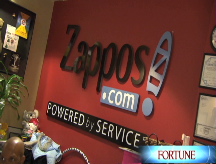Belt-tightening at Google
Last year, all employees got a thousand-dollar holiday bonus. This year, they got a Dream Phone.

SAN FRANCISCO (Fortune) -- The plight of workers everywhere is bleak. Witness the turn of events at Google, where this past Christmas no armored car pulled up to the Googleplex to dispense a thousand bucks in crisp hundred-dollar bills to each and every employee, as one did the year before.
Google, like more prosaic companies, is cutting back. Having said that, the belt tightening is of a typically Googley variety: In lieu of the fistful of Benjamins, all Googlers instead got a brand-new "Dream Phone," the iPhone-challenging wireless device that runs Google's new Android software, a goodie worth about $400.
In other words, while No. 4-ranked Google no longer is the best company to work for in the United States, as it was for two consecutive years, it's not too shabby an employer either. The company still offers perks that make competitors green with envy: three free meals a day in every location, onsite car-wash and oil-change services, massages, stimulating lectures by the world's authorities on every subject, and so on.
What has changed is that the company's senior managers seem at least vaguely aware that the benefits it offers employees (one of whom, it should be noted, is this writer's wife) are unusual - and at times too costly.
For the first time this winter there will be no all-company, all-expenses paid ski trip - which had morphed into an optional ski outing, camping expedition or massive field trip to Disneyland. Gone too is the 50% discount at the Google store, which sells Google-emblazoned shirts, lava lamps and other tchotchkes. (Googlers now get a 20%-off deal instead.)
That Google is trimming at all while maintaining most of its largesse begs the question, why bother? Laszlo Bock, vice president for people operations (HR chief in Googlespeak), says the company has gotten better and more thorough about reviewing all of its business operations, including benefits.
"All of our leaders have a very real-time pulse on the economics of the business and how our users are behaving," says Bock, a GE alumnus. "We've taken a moment to acknowledge there's a lot going on externally from the company" - Bock is speaking euphemistically here about the severe global recession - "and we've decided it makes sense to be sensitive about what perquisites and benefits to maintain." (Google's getting real in terms of personnel as well: In January it announced its first-ever layoff of full-time employees. It cut 100 recruiters it longer needs because its hiring has slowed.)
Certain perks are sacrosanct at Google. Food, for example, is a sacred cow, so to speak. Cynics says Google feeds its workers so they'll toil longer; Google says the free gourmet cafes are all about encouraging people to interact, which breeds efficiency, community and innovation.
Google has scaled back the subsidies it once paid for employees who bought hybrid vehicles, yet it maintains a program that funds charitable gifts by employees who commute to work in "self-powered vehicles."
Google (GOOG, Fortune 500) won't say how much money it intends to save by forcing employees to pay for their own lift tickets or rides on Space Mountain, and it implies the moves have nothing to do with its slowing revenue growth rate or its stock price, which is hovering at less than 50% of its all-time high. Yet expense-cutting of any kind undeniably is a slippery slope - especially for employees who once queued up and held out their hands when the armored car came to visit. ![]()
-
 The retail giant tops the Fortune 500 for the second year in a row. Who else made the list? More
The retail giant tops the Fortune 500 for the second year in a row. Who else made the list? More -
 This group of companies is all about social networking to connect with their customers. More
This group of companies is all about social networking to connect with their customers. More -
 The fight over the cholesterol medication is keeping a generic version from hitting the market. More
The fight over the cholesterol medication is keeping a generic version from hitting the market. More -
 Bin Laden may be dead, but the terrorist group he led doesn't need his money. More
Bin Laden may be dead, but the terrorist group he led doesn't need his money. More -
 U.S. real estate might be a mess, but in other parts of the world, home prices are jumping. More
U.S. real estate might be a mess, but in other parts of the world, home prices are jumping. More -
 Libya's output is a fraction of global production, but it's crucial to the nation's economy. More
Libya's output is a fraction of global production, but it's crucial to the nation's economy. More -
 Once rates start to rise, things could get ugly fast for our neighbors to the north. More
Once rates start to rise, things could get ugly fast for our neighbors to the north. More












